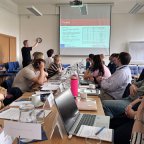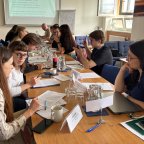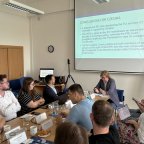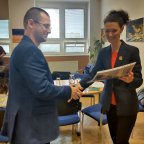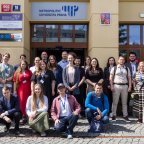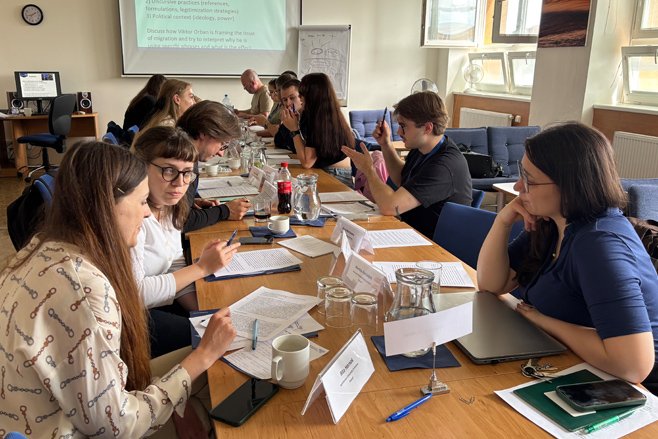
Populism, Foreign Policy, and a Week of Intense Debate: PhD Summer School at MUP
9. 6. 2025 Autor: Šárka Kolmašová From June 2 to 6, the Center for Security Studies (C4SS) at Metropolitan University Prague hosted a week-long Doctoral Summer School under the Erasmus+ Blended Intensive Programme (BIP), taking on one of today’s most urgent political questions: How is populism reshaping foreign and security policy in Central and Eastern Europe? The event gathered PhD students from Poland, Slovakia, Lithuania, Portugal, and Bulgaria, each bringing fresh insights and case studies from their own regions. Across five packed days—and two preparatory online sessions—participants dissected narratives, analyzed media, pitched research, and explored publishing strategies with a lineup of top-tier scholars.The school kicked off with two online webinars in May, setting the stage for in-person collaboration. The first introduced key theoretical concepts—populism, post-populism, and foreign policy analysis—alongside an icebreaker where participants met and shared their research angles. The second featured a standout virtual panel with Erin K. Jenne (CEU) and David Cadier (Sciences Po), offering timely reflections on populist foreign policy strategies.
In Prague, the summer school opened with a welcome from Oldřich Bureš, head of C4SS, followed by an orientation led by Šárka Kolmašová, head of the Department of International Relations and European Studies. The first day closed with a keynote lecture by Petr Kratochvíl, who introduced the Horizon Europe project ACTEU and laid out the conceptual gaps in the current literature on populism and trust in democratic institutions.
Over the following days, the programme explored the issue from multiple angles. Jakub Eberle (Charles University) led a seminar on populist narratives and their rhetorical structure, followed by a group workshop applying discourse analysis tools to real-life texts. Wednesday shifted focus to the digital terrain, where Tiago Gomes Lapa (Charles University) examined how platform design reshapes populist messaging. Asya Metodieva (IIR) then focused on disinformation, state control of online content, and the erosion of traditional journalism.
Thursday featured a mix of policy, regional dynamics, and practical skills. Mats Braun (MUP & IIR) unpacked his recent policy paper on populism in the European Parliament, using it to demonstrate how academics can write policy-relevant outputs. A regional panel discussion followed, with contributions from Ana Bojinović Fenko (University of Ljubljana), Burtejin Zorigt (Heinrich-Böll-Stiftung), and Katarzyna Kochlöffel (IIR), who explored how populist actors in Czechia, Hungary, Slovakia, and Slovenia construct foreign policy narratives in times of crisis. The session was moderated by Jacqueline Dufalla, postdoctoral researcher at C4SS and co-organizer of the event.
Later that afternoon, things took a more dynamic turn. Participants engaged in an academic “speed-dating” session, where they had two minutes to pitch their research projects in rotating rounds. This high-energy workshop was designed to help them sharpen their arguments and practice clarity under pressure. Adding even more value, Elsa Tulmets (European University Viadrina) joined the session to provide targeted feedback.
The final day brought it all together. Participants presented their research in two thematic panels, tackling topics such as the geopolitical use of memory politics in Hungarian foreign policy, the role of AI in shaping and resisting populist narratives, and the ideological drivers of populism’s impact on Central and Eastern European diplomacy. Case studies ranged from Moldova’s migration policy to Lithuania’s populist discourse, and from populist opposition to the EU Green Deal to the rise of market-oriented “liberal populism” in Argentina.
To wrap up the week, Aleš Karmazin and Martina Varkočková, editors of CEJISS, led a publishing roundtable, demystifying the peer-review process and advising students on how to get their work into top-tier journals.
This BIP Summer School did more than deepen scholarly insight into populism and foreign policy—it embodied the spirit of international academic collaboration at its best. It bridged theory and practice, fostered critical engagement across disciplines, and created space for genuine exchange between early-career researchers and seasoned experts. As participants collected their certificates and looked back at the group photo taken on the first day, it was clear that the summer school had fulfilled its core objective: to create a vibrant community of emerging and established scholars. Beyond lectures and workshops, the programme fostered meaningful academic exchange, peer learning, and regional collaboration—laying the groundwork for future research partnerships and continued dialogue across borders.
Další z rubriky
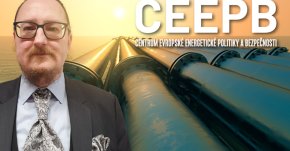 Založení Centra evropské energetické politiky a bezpečnosti
1. 2. 2026 Autor: Lukáš Tichý
Na MUP vzniká nové výzkumné centrum, které doplní Centrum bezpečnostních studií a další regionálně zaměřená výzkumná centra – Centrum pro studium Afriky, Centrum pro studium Blízkého východu a Centrum iberoamerických studií. Fungovat bude pod katedrou mezinárodních vztahů a evropských studií a vedením dr. Lukáše Tichého.
Založení Centra evropské energetické politiky a bezpečnosti
1. 2. 2026 Autor: Lukáš Tichý
Na MUP vzniká nové výzkumné centrum, které doplní Centrum bezpečnostních studií a další regionálně zaměřená výzkumná centra – Centrum pro studium Afriky, Centrum pro studium Blízkého východu a Centrum iberoamerických studií. Fungovat bude pod katedrou mezinárodních vztahů a evropských studií a vedením dr. Lukáše Tichého.
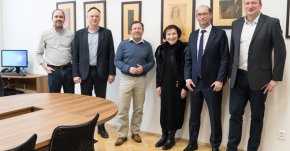 MUP navštívil prof. Miller, předseda Národního akreditačního úřadu pro terciární vzdělávání
29. 1. 2026 Autor: Tomáš Nikodym
Metropolitní univerzitu Praha navštívil prof. Mgr. Jaroslav Miller, M.A., Ph.D., předseda Národního akreditačního úřadu pro terciární vzdělávání (NAÚ). Na úvod setkání představilo vedení MUP univerzitu, její studijní programy, vědeckou činnost a program Škola bez bariér, v jehož rámci MUP umožňuje studium osobám s pohybovým postižením.
MUP navštívil prof. Miller, předseda Národního akreditačního úřadu pro terciární vzdělávání
29. 1. 2026 Autor: Tomáš Nikodym
Metropolitní univerzitu Praha navštívil prof. Mgr. Jaroslav Miller, M.A., Ph.D., předseda Národního akreditačního úřadu pro terciární vzdělávání (NAÚ). Na úvod setkání představilo vedení MUP univerzitu, její studijní programy, vědeckou činnost a program Škola bez bariér, v jehož rámci MUP umožňuje studium osobám s pohybovým postižením.
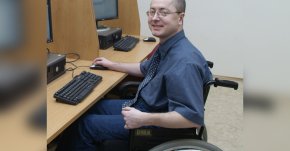 Zemřel Martin Hanibal, bojovník s nepřízní osudu, který psal očima
4. 2. 2026 Autor: Kamila Klausová
Martin Hanibal byl těžce, nevyléčitelně nemocný. Věděl to, ale nikdy život nevzdal. Třicet let bojoval se zákeřnou, progresivní roztroušenou sklerózou, která ho posadila na vozík, ale přitom nezůstal na kolečkách „jen“ sedět. Vystudoval vysokou školu a dokud mohl, angažoval se v pomoci podobně nemocným. Zemřel v Praze v pátek 23. ledna ve věku 52 let. Na posledním rozloučení 3. února v malé obřadní síni ve Strašnicích nechyběli zástupci Metropolitní univerzity Praha (MUP), neboť Martin Hanibal byl jedním z prvních absolventů jejího stipendijního programu Škola bez bariér a patřil k ikonickým postavám života školy i mimoškolních aktivit pro hendikepované.
Zemřel Martin Hanibal, bojovník s nepřízní osudu, který psal očima
4. 2. 2026 Autor: Kamila Klausová
Martin Hanibal byl těžce, nevyléčitelně nemocný. Věděl to, ale nikdy život nevzdal. Třicet let bojoval se zákeřnou, progresivní roztroušenou sklerózou, která ho posadila na vozík, ale přitom nezůstal na kolečkách „jen“ sedět. Vystudoval vysokou školu a dokud mohl, angažoval se v pomoci podobně nemocným. Zemřel v Praze v pátek 23. ledna ve věku 52 let. Na posledním rozloučení 3. února v malé obřadní síni ve Strašnicích nechyběli zástupci Metropolitní univerzity Praha (MUP), neboť Martin Hanibal byl jedním z prvních absolventů jejího stipendijního programu Škola bez bariér a patřil k ikonickým postavám života školy i mimoškolních aktivit pro hendikepované.
